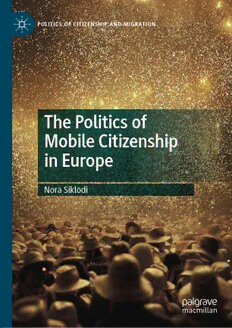
The Politics of Mobile Citizenship in Europe PDF
Preview The Politics of Mobile Citizenship in Europe
POLITICS OF CITIZENSHIP AND MIGRATION The Politics of Mobile Citizenship in Europe Nora Siklodi Politics of Citizenship and Migration Series Editors Willem Maas Department of Political Science York University Toronto, ON, Canada Justin Gest George Mason University Arlington, VA, USA The Politics of Citizenship and Migration series publishes exciting new researchinallareasofmigrationandcitizenshipstudies.Opentomultiple approaches, the series considers normative, conceptual, comparative, empirical,historical,methodological,andtheoreticalworks.Versatile,the series publishes single and multi-authored monographs, short-form Pivot books, and edited volumes. Broad in its coverage, the series promotes research on citizenship and migration laws and policies, voluntary and forced migration, rights and obligations, demographic change, dias- poras, political membership or behavior, public policy, minorities, trans- formations in sovereignty and political community, border and security studies, statelessness, naturalization, integration and citizen-making, and subnational, supranational, global, corporate, or multilevel citizenship. More information about this series at http://www.palgrave.com/gp/series/15403 Nora Siklodi The Politics of Mobile Citizenship in Europe Nora Siklodi Politics and International Relations University of Portsmouth Portsmouth, Hampshire, UK Visiting Fellow in Democracy and Citizenship in Education Norwegian University of Science and Technology Trondheim, Norway ISSN 2520-8896 ISSN 2520-890X (electronic) Politics of Citizenship and Migration ISBN 978-3-030-49050-8 ISBN 978-3-030-49051-5 (eBook) https://doi.org/10.1007/978-3-030-49051-5 © The Editor(s) (if applicable) and The Author(s), under exclusive license to Springer Nature Switzerland AG 2020 This work is subject to copyright. All rights are solely and exclusively licensed by the Publisher, whether the whole or part of the material is concerned, specifically the rights of translation, reprinting, reuse of illustrations, recitation, broadcasting, reproduction on microfilms or in any other physical way, and transmission or information storage and retrieval,electronicadaptation,computersoftware,orbysimilarordissimilarmethodology now known or hereafter developed. The use of general descriptive names, registered names, trademarks, service marks, etc. in this publication does not imply, even in the absence of a specific statement, that such namesareexemptfromtherelevantprotectivelawsandregulationsandthereforefreefor general use. Thepublisher,theauthorsandtheeditorsaresafetoassumethattheadviceandinforma- tion in this book are believed to be true and accurate at the date of publication. Neither the publisher nor the authors or the editors give a warranty, express or implied, with respecttothematerialcontainedhereinorforanyerrorsoromissionsthatmayhavebeen made.Thepublisherremainsneutralwithregardtojurisdictionalclaimsinpublishedmaps and institutional affiliations. Cover credit: © Roc Canals Photography/Moment/Getty Image This Palgrave Macmillan imprint is published by the registered company Springer Nature Switzerland AG The registered company address is: Gewerbestrasse 11, 6330 Cham, Switzerland Acknowledgements I would like to express my deepest gratitude to the students who partic- ipated in the focus groups in Stockholm and London. Their relentless enthusiasm despite the, at times, bumpy debates painted a vivid portrait of mobile citizenship—a source of immense inspiration for my work then and now. Mysincereappreciationgoestofriendsandcolleagues—Ifeelfortunate to call the people listed below as both—without whom this book would not have happened. Be it because they provided me with help, construc- tive feedback or a listening ear at the different stages of the research and writing progress. In particular, I would like to take this opportunity to thank Nicholas Allen, Angela Crack, James Dennis, Mark Field, Robert Frith, Carine Germond, Wolfram Kaiser, Karen Heard-Laureote, Claudia Lueders, John Oates, Olivia Rutazibwa, Susana Sampaio-Dias, Anke SF, James Sloam, Aleksandra Sojka, Trond Solhaug and Annabel Tremlett. The research phase for this book was funded by a Ph.D. studentship from Royal Holloway, University of London, and parts of it were hosted by Stockholm University. The writing phase was supported by the Jean MonnetCentreofExcellence(CESTE2)attheUniversityofPortsmouth and the Democracy and Citizenship in Education (DACED) research group at the Norwegian University of Science and Technology. I am grateful to the series editors, Willem Maas and Justin Gest, the reviewers and colleagues at Palgrave, Anca Pusca, Kumaravel Senbagaraj and Katelyn Zigg, for their support with this book project. v vi ACKNOWLEDGEMENTS Last but not least, I would like to thank my non-academic circle of family and friends for their support and extraordinary patience. Thank you. Contents 1 Introduction: The Politics of Contemporary Citizenship: What’s Going On? 1 2 Citizenship, Free Movement and the EU 27 3 A Snapshot of Mobile Citizenship in the EU 73 4 Community Building Processes and EU Mobility 91 5 National Citizenship in a Mobile Europe: They Are Changing! 119 6 EU Citizenship and Mobility: A Less Than Perfect Partnership 153 7 Conclusion: Where Is Mobile Citizenship in Europe—And Elsewhere—Heading? 191 Appendix: Research Methods Notes 209 Index 223 vii List of Figures Fig. 3.1 Attitudes towards migrant groups in Sweden, the UK and the EU-28 in 2018 78 Fig. 3.2 Mobile/stayer senses of European citizenship 80 Fig. 3.3 Mobile/stayer attitudes towards EU mobiles 80 Fig. 3.4 Mobile/stayer attitudes towards TCNs 81 Fig. 3.5 Mobile/stayer familiarity with EU rights 82 Fig. 3.6 Mobile/stayer views on ‘voice counts’ in politics 83 ix List of Tables Table 1.1 Intra-EU mobility per host country (2003–2018) 3 Table 2.1 Analytical framework to studying contemporary citizenship 50 Table 3.1 Senses of national and European citizenship in the EU, Sweden and the UK (2015–2018) 76 Table 3.2 Determinants of senses of European citizenship in 2018: Binary logistic regression 85 Table 4.1 Categories of active/passive national and EU citizens today 114 xi
